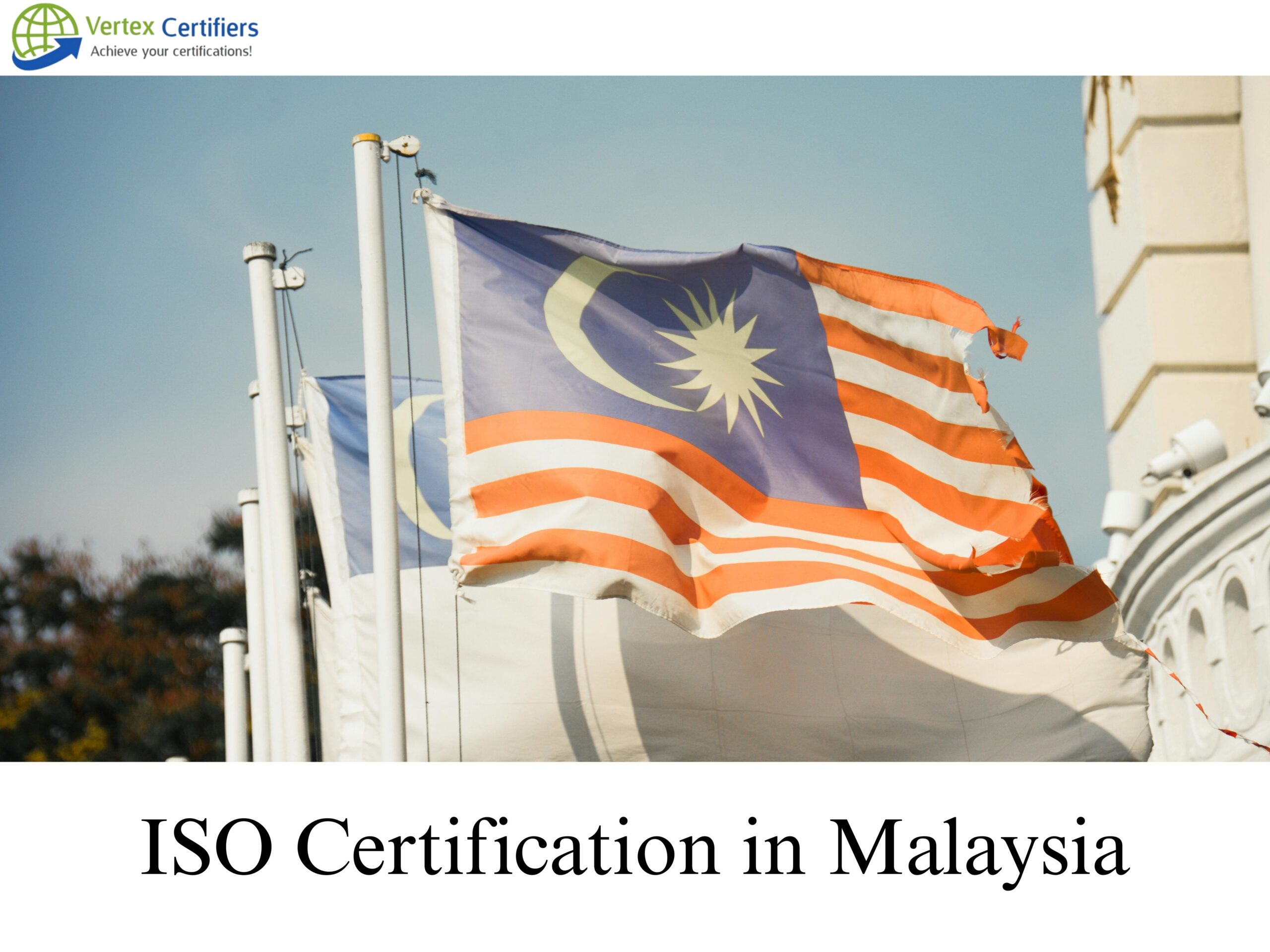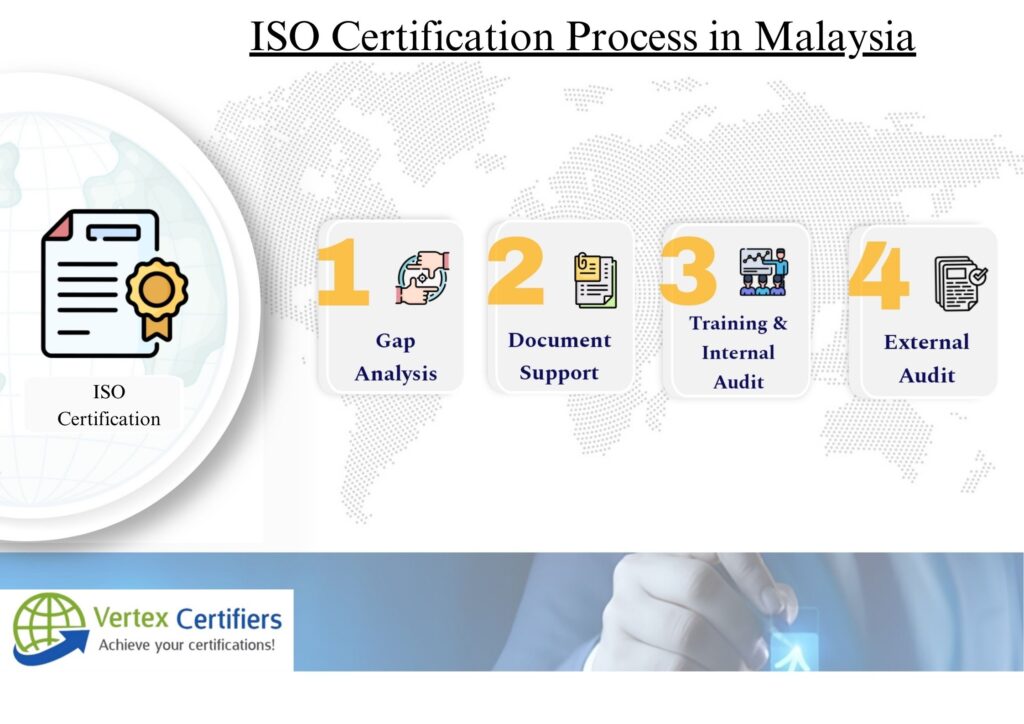
ISO Certification in Malaysia:
ISO Certification in Malaysia, Vertex Certifiers is a global ISO consulting firm providing end-to-end ISO certification services in Malaysia, covering major cities such as Kuala Lumpur, Penang, Johor Bahru, and Selangor. We offer consultation for top ISO standards including ISO 9001, ISO 14001, ISO 45001, ISO 27001, ISO 22000, ISO 50001, ISO 13485, ISO 22301, ISO 37301, ISO 21001, ISO 41001 and ISO 20000-1 in Malaysia.
Our services include Gap Analysis, Documentation, Training, Implementation, Internal Audits, and Certification Support. We assist Malaysian organizations across manufacturing, IT, logistics, construction, food, and service sectors to achieve ISO compliance efficiently and cost-effectively.
ISO certification is important for companies in Malaysia because it helps enhance product and service quality, improve operational efficiency, reduce risks, and ensure compliance with both local and international regulations. It also strengthens brand reputation and global competitiveness, which is crucial for Malaysia’s rapidly growing sectors like manufacturing, IT, and export-oriented businesses. By adopting ISO standards, Malaysian businesses can build trust with customers, partners, and investors, facilitating access to new markets and improving overall operational excellence.
ISO Certification Process in Malaysia
The ISO certification process commonly involves:

- Gap Analysis: Evaluate current processes against ISO standards.
- Documentation: Prepare necessary manuals and procedures.
- Implementation: Guide teams to adopt ISO-compliant processes.
- Internal Audit & Training: Ensure organizational readiness.
- Final Audit & Certification Support: Coordinate with certification bodies for certification issuance.
This structured approach helps companies achieve compliance effectively and gain the benefits of certification.
- ISO 9001 Certification in Malaysia — This Quality Management System standard helps organizations improve product and service quality by setting structured processes focused on customer satisfaction. Businesses adopting ISO 9001 achieve better operations control, reduce errors, and build trust with clients. It is essential for meeting stringent food industry regulations, reducing risks of contamination, and increasing market access both locally and internationally.
- ISO 14001 Certification in Malaysia — This Environmental Management System promotes sustainable business practices. Companies can reduce environmental impact through better resource management, waste reduction, and regulatory compliance. ISO 14001 helps businesses appeal to eco-conscious consumers and partners while often reducing operational costs through efficiency.
- ISO 45001 Certification in Malaysia — Focused on Occupational Health & Safety, this standard ensures safer workplaces by identifying hazards, reducing workplace injuries, and fostering a culture of safety. Organizations implementing ISO 45001 demonstrate their commitment to employee wellbeing and legal compliance, which also improves morale and productivity.
- ISO 27001 Certification in Malaysia — Critical for the IT and service sectors, ISO 27001 sets a framework for Information Security Management. It helps organizations protect sensitive data from breaches, comply with privacy regulations, and build client confidence in their digital security measures.
- ISO 22000 Certification in Malaysia — For food processing and export businesses, this Food Safety Management System standard ensures food products meet safety and quality requirements throughout the supply chain. It helps mitigate contamination risks and align with international trade requirements to access broader markets.
- ISO 50001 Certification in Malaysia — Energy Management System standard focuses on optimizing energy use. Companies can reduce costs and carbon footprint by analyzing and improving energy consumption systematically. This supports sustainability goals and compliance with emerging environmental regulations.
Major Cities Covered by ISO Consulting in Malaysia with Explanation
- ISO Certification in Kuala Lumpur — As Malaysia’s capital, Kuala Lumpur houses diverse industries like IT, manufacturing, and services. Businesses here benefit from ISO certification by improving operational standards and gaining competitive advantage nationally and globally.
- ISO Certification in Penang — Renowned for electronics and manufacturing, Penang companies use ISO standards to enhance product quality and comply with export requirements, helping them maintain international partnerships and customer trust.
- ISO Certification in Johor Bahru — Johor Bahru’s industrial and logistics sectors rely on ISO certifications for quality assurance, safety compliance, and efficient supply chain management, facilitating smoother operations and market expansion.
- ISO Certification in Selangor — With its diversified economy, Selangor’s manufacturers, construction firms, and IT companies leverage ISO standards to optimize processes, manage risks, and sustain environmental responsibility, all crucial for sustained growth and regulatory adherence.
Benefits of ISO Certification in Malaysia
ISO certification offers numerous benefits to companies in Malaysia, playing a crucial role in strengthening their market position and operational excellence. Key benefits include:
- Enhanced Credibility and Reputation: ISO certification validates that a business meets internationally recognized standards, significantly boosting credibility and building trust with customers, partners, and investors both domestically and internationally.
- Competitive Advantage: Companies with ISO certification differentiate themselves by demonstrating their commitment to quality, safety, and continuous improvement, giving them an edge over competitors in Malaysia’s diverse market.
- Improved Operational Efficiency: Implementation of ISO standards streamlines business processes, reduces errors and waste, and enhances workflow, leading to increased productivity and cost savings.
- Market Access and Global Recognition: ISO certification helps Malaysian companies reduce trade barriers and gain access to international markets by complying with global standards required by clients and regulators.
- Regulatory Compliance and Risk Management: ISO standards assist businesses in complying with local and international regulations, minimizing risks related to product quality, safety, and environmental impact.
- Increased Customer Satisfaction: Through standardized quality management and consistent delivery, ISO-certified companies improve customer confidence and loyalty, which fosters long-term business relationships.
- Support for Sustainable Practices: Certifications like ISO 14001 and ISO 50001 emphasize environmental responsibility and energy efficiency, helping Malaysian companies align with sustainability goals and regulatory requirements.
The cost of ISO certification in Malaysia varies depending on several factors such as the size of the organization, the complexity and scope of the certification, and the chosen certification body. Key points about the cost include:
- For ISO 9001 Certification, typical costs range depending on whether the company uses consultant services, the duration of the certification process, and manpower requirements. Online package options tend to be more affordable and faster
- The cost consists of preparation work, documentation, training, internal audits, and the final certification audit by an accredited body.
- Larger organizations with complex processes will incur higher costs due to more extensive auditing and documentation requirements.
- Additional fees may apply for annual renewals and surveillance audits to maintain certification.
- Certain Malaysian certification providers also offer consultancy and training services as part of the certification package.
- For exact cost estimates tailored to a business’s unique scope, consulting with an ISO expert or certification body is recommended.
In summary, ISO certification cost in Malaysia typically ranges from roughly RM 10,000 to RM 40,000 or more. It is an investment in quality and operational excellence that can offer strong returns through process improvement, market access, and enhanced credibility.
For personalized quote and consultancy on ISO certification cost and process in Malaysia, reach out to Vertex Certifiers at:
For hassle-free ISO Certification in Malaysia, contact Vertex Certifiers today. Our experts will guide you through every step of the certification process to ensure your business achieves recognized standards and competitive growth.
Email: info@vertexcertifiers.com
Our Services
- GMP Certification
- GLP Certification
- GDP Certification
- Halal Certificate
- Organic Certificate
- CE Marking Certification
- RoHS Certification
- FDA Certification
- CMMI Certification
- Cyber Security
- VAPT Testing
- Security Assessment
Our Clients





